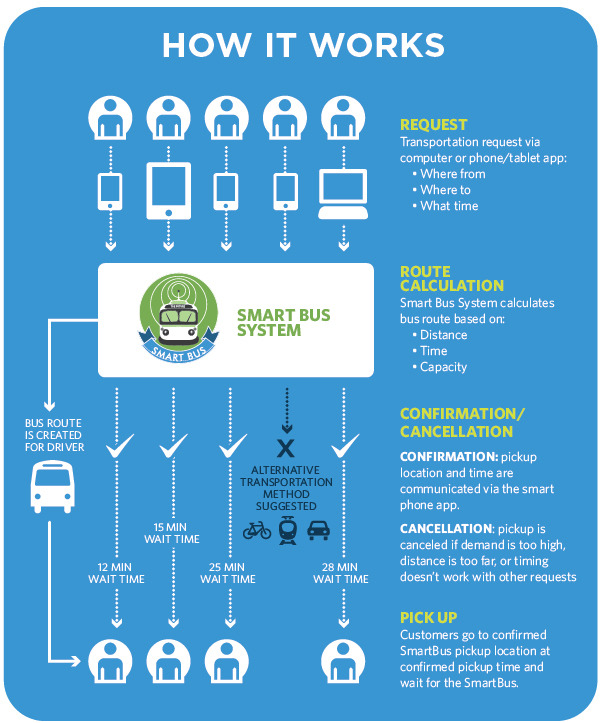The construction of Route 128 proved to be a massive catalyst for change in the Greater Boston region. Not only did it help spur news businesses and grow the economy around the city, but it fueled the rise of suburban living. In today’s world, though, more and more people are moving back into urban centers while some, still residing in the burbs, have followed another trend in going car-less.
Because the Route 128 corridor is so heavily-trafficked and so densely populated, a viable mode of transportation is needed. That’s why the 128 Business Council launched a Kickstarter campaign in hopes of building a Smart Bus fleet to better serve those not in close proximity to public transit, or can’t necessarily afford private transportation services.
Smart Bus combines the most advantageous facets of startups like Bridj, a company that offers more direct lines of travel than MBTA buses, while also hauling high volumes of commuters like the MBTA.
Looking to garner $320,000 total, the minds behind Smart Bus have already secured a $150,000 Congestion Mitigation and Air Quality grant and have been tinkering with the Smart Bus idea for the past two years, also locking down the necessary state licenses to operate a bus in the process.
The Smart Bus would work as such: A user requests the bus using the app on a mobile device, entering information such as where they want to be picked up, what time they’ll be needing a ride, and their destination; the Smart Bus GPS platform then determines the best and most convenient route; and the user hitches a ride.

“The driver’s GPS automatically routes them as the system adds riders.” Monica Tibbits-Nutt, executive director of 128 Business Council told BostInno about Smart Bus’s real-time automation.
And, after a test period, she hopes to release the software to other transit authorities and operators for the benefit of suburbanites.
“We would operate them for the pilot test period (potentially up to 10 buses) and then release the software to other RTA’s and private transit operators,” she added. “We are starting the pilot in the [Route 128] corridor, but it is applicable in any area with bus service.”
The buses themselves will be outfitted with the proper technology to facilitate vehicle location, scheduling, dispatching, routing, trip assignment, electronic manifesting, and fare collection, all in real-time.
With a goal of eventually putting upwards of 10 buses on the road, the 128 Business Council and its partners are looking at a 56-week timetable before an operating plan is solidified, technology is perfected, designs are rendered and testing proves successful.
At the time of this writing, they’ve raised $610 of their goal from 14 backers and still have 28 days until their crowdsourcing efforts come to an end.
